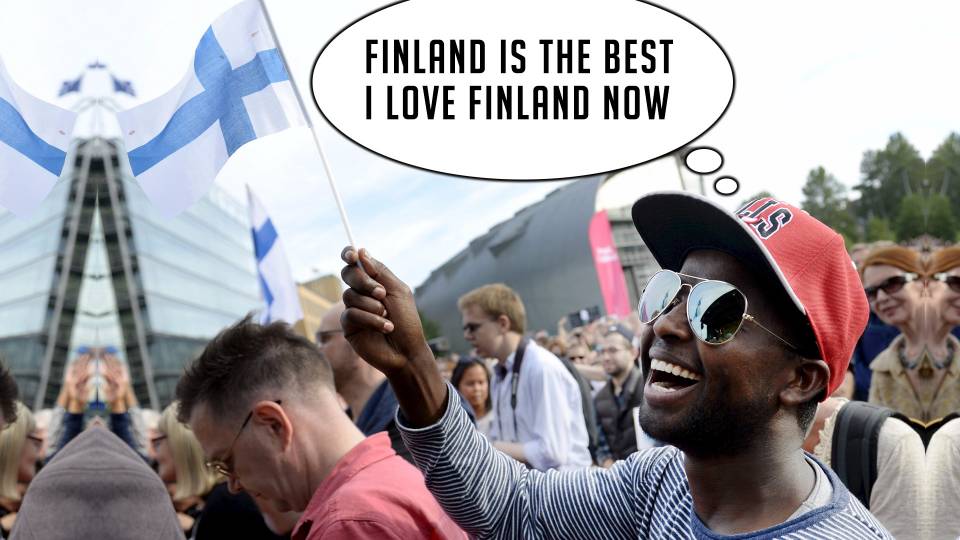Free Cash to be Handed out by Government in Finland
Finland will soon hand out cash to 2,000 jobless people, free of bureaucracy or limits on side earnings. The idea, universal basic income, is gaining traction worldwide.
No one would confuse this frigid corner of northern Finland with Silicon Valley. Notched in low pine forests just 100 miles below the Arctic Circle, Oulu seems more likely to achieve dominance at herding reindeer than at nurturing technology start-ups.
But this city has roots as a hub for wireless communications, and keen aspirations in innovation. It also has thousands of skilled engineers in need of work. Many were laid off by Nokia, the Finnish company once synonymous with mobile telephones and more recently at risk of fading into oblivion.
While entrepreneurs are eager to put these people to work, the rules of Finland's generous social safety net effectively discourage this. Jobless people generally cannot earn additional income while collecting unemployment benefits or they risk losing that assistance. For laid-off workers from Nokia, simply collecting a guaranteed unemployment check often presents a better financial proposition than taking a leap with a start-up in Finland, where a shaky technology industry is trying to find its footing again.
Now, the Finnish government is exploring how to change that calculus, initiating an experiment in a form of social welfare: universal basic income. Early next year, the government plans to randomly select roughly 2,000 unemployed people — from white-collar coders to blue-collar construction workers. It will give them benefits automatically, absent bureaucratic hassle and minus penalties for amassing extra income.
The government is eager to see what happens next. Will more people pursue jobs or start businesses? How many will stop working and squander their money on vodka? Will those liberated from the time-sucking entanglements of the unemployment system use their freedom to gain education, setting themselves up for promising new careers? These areas of inquiry extend beyond economic policy, into the realm of human nature.
The answers — to be determined over a two-year trial — could shape social welfare policy far beyond Nordic terrain. In communities around the world, officials are exploring basic income as a way to lessen the vulnerabilities of working people exposed to the vagaries of global trade and automation. While basic income is still an emerging idea, one far from being deployed on a large scale, the growing experimentation underscores the deep need to find effective means to alleviate the perils of globalization.
The search has gained an extraordinary sense of urgency as a wave of reactionary populism sweeps the globe, casting the elite establishment as the main beneficiary of economic forces that have hurt the working masses. Americans' election of Donald J. Trump, who has vowed to radically constrain trade, and the stunning vote in Britain to abandon the European Union, have resounded as emergency sirens for global leaders. They must either update capitalism to share the spoils more equitably, or risk watching angry mobs dismantle the institutions that have underpinned economic policy since the end of World War II.
Universal basic income is a catchall phrase that describes a range of proposals, but they generally share one feature: All people in society get a regular check from the government — regardless of their income or whether they work. These funds are supposed to guarantee food and shelter, enabling people to pursue their own betterment while contributing to society.
A Silicon Valley start-up incubator, Y Combinator, is preparing a pilot project in Oakland, Calif., in which 100 families will receive unconditional cash grants ranging from $1,000 to $2,000 a month. Voters in Switzerland recently rejected a basic-income scheme, but the French Senate approved a trial. Experiments are being readied in Canada and the Netherlands. The Indian government has been studying basic income as a means of alleviating poverty.
"The last two years, there's been an explosion of interest in basic income," says Guy Standing, a research associate with the School of Oriental and African Studies at the University of London, and a co-founder of the Basic Income Earth Network, an institution created to promote the idea. "The elites realize that the inequalities are becoming politically dangerous."
For generations, policy makers have sought the magic formula for so-called full employment, with nearly everyone who wants a job able to find one. Traditional unemployment insurance schemes were devised in an age when the cyclical nature of factory life was dominant. Workers who were idled in lean times could pay their bills using unemployment benefits while awaiting the inevitable return of flush ones.
Universal basic income is gaining consideration in part as an acknowledgment that the labor market has changed so fundamentally that full employment may amount to a fantasy. Factories have been refashioned into urban-chic office spaces. Robots are replacing workers, while the gig economy turns full-time jobs into contract positions.
Basic income is intended to be permanent, built for an age in which demand for labor may be perpetually slack. Whatever happens — say everyone becomes a part-time Uber driver, or Uber drivers are replaced by self-driving cars — everyone can count on sustenance.
Strikingly, basic income is being championed across the ideological spectrum.
Utopian dreamers envision it as an emancipation from the meaninglessness of low-wage work. People stuck in dead-end jobs at fast-food restaurants could abandon laboring over the fryolator in favor of growing organic vegetables and reading to their children.
Labor advocates embrace basic income as a means of increasing bargaining power, enabling workers to eschew poverty-level wages while holding out for better.
Libertarians see it as a means of shrinking government by consolidating social service programs. Liberals envision it as a way to remove the stigma of public assistance: Instead of standing in line at the grocery store bearing food stamps while suffering the judgment of other shoppers — Shouldn't she be buying spinach instead of frozen pizza? — poor people would get the same check as everyone else.
The technology world has seized on basic income as the response to automation and its threat of joblessness. If everyone's needs are being met, then society can embrace robots and liberation from drudge work.
Yet the expensive price tag attached to anything that is truly universal makes it a political nonstarter in many countries — especially in the United States, where Mr. Trump just appointed a labor secretary who is critical of simply raising the minimum wage.
If every American were to receive just $10,000 a year, the tab would be roughly $3 trillion a year, roughly eight times what the United States now spends on social service programs. The government might just as well commit to handing out unicorns.
Beyond arithmetic, basic income confronts fundamental disagreements about human reality. If people are released from fears that — absent work — they risk finding themselves sleeping outdoors, will they devolve into freeloaders?
"Some people think basic income will solve every problem under the sun, and some people think it's from the hand of Satan and will destroy our work ethic," says Olli Kangas, who oversees research at Kela, a Finnish government agency that administers many social welfare programs. "I'm hoping we can create some knowledge on this issue."
Start-Ups in Pine Forests
Half a millennium ago, Thomas More's seminal novel, "Utopia," included the suggestion that public assistance might be a better way to deter thieves than a death sentence. More than two centuries later, the American revolutionary agitator Thomas Paine proposed creating a national pool of money distributed to every adult.
The Rev. Dr. Martin Luther King Jr. promoted basic income. The libertarian economist Milton Friedman embraced a variant: negative income taxes that would put cash in the pockets of the poor.
Yet with the exception of a few experiments, basic income has been confined to the margins of policy conversations.
Until now.
Finland's concerns are pragmatic. The government has no interest in freeing wage earners to write poetry. It is eager to generate more jobs.
The global financial crisis and its aftermath played out against a wrenching economic refashioning here. The growth of tablets and smartphones assailed a major industry, commercial paper manufacturing. A crisis in neighboring Russia diminished trade. Over the last decade, Finland's economy has grown not at all.
For workers, the shock has been cushioned by a comprehensive social welfare system. In the five years after suffering a job loss, a Finnish family of four that is eligible for housing assistance receives average benefits equal to 73 percent of previous wages, according to data from the Organization for Economic Cooperation and Development. That is nearly triple the level in the United States.
But the social safety net also appears to be impeding the reinvigoration of the economy by discouraging unemployed people from working part time.
"It always should be worth taking the job rather than staying home and taking the benefits," says Finland's minister for social affairs and health, Pirkko Mattila. "We have to take the risk to do this experiment."
Oulu, a city of nearly 200,000 people on the Nordic Sea, stands as a potentially fertile testing ground.
In centuries past, inhabitants occupied themselves shipping salmon and tar upriver to Russia while trying not to freeze to death. More recently, the city has evolved into a center for wireless communications.
Three years ago, Microsoft purchased Nokia's handset business, raising local hopes of a revival. But last year, Microsoft went on to shutter the operation. Local Nokia jobs have been halved, falling to 2,500 from 5,000. Oulu's unemployment rate now sits above 16 percent, more than double the national average.
City leaders portray this as an opportunity to start over, describing a future centered on companies like Asmo Solutions.
With its office in a first-story walk-up, the company checks the boxes for requisite elements of a modern start-up. Coders stare into laptops while leaning against beanbag chairs arrayed across red shag carpeting. The founder, Asmo Saloranta, 35, wears a silver hoop earring, his blond hair pulled back into a ponytail. He used to be chief executive; now he is chief visionary. He has designed a phone charger that draws power only when a phone is connected.
Oulu is an ideal place to start a technology business, he says: "There are highly talented tech people."
But hiring them is maddeningly complicated.
Mr. Saloranta has his eyes on a former Nokia employee who is masterly at developing prototypes. He only needs him part time. He could pay 2,000 euros a month (about $2,090). Yet this potential hire is bringing home more than that via his unemployment benefits.
"It's more profitable for him to just wait at home for some ideal job," Mr. Saloranta complains.
Basic income would fix this, he says: "It would activate many more unemployed people."
This is a part of the debate that often gets missed. Monthly checks for everyone may look like socialism, but proponents advance it as a way to invigorate capitalism.
From Italy to India, companies that would like to leave behind unprofitable enterprises in favor of fresh pursuits hold back because of the expense and reputational damage of firing people. Basic income could be the tool that makes restructuring palatable.
With basic income in place, companies might be more inclined to take a risk on hiring more aggressively — adding vigor to the local economy — knowing they have the freedom to be ruthless in cutting loose those workers who prove disappointing.
"It does make it easier to have labor flexibility," says Karl Widerquist, a philosopher at Georgetown University in Qatar, and a leading advocate for basic income. "I know that if I have to close down this operation, everyone is going to be O.K."
People Want Better
People who lose jobs would do well to gain training in modern trades. On this point, economists universally concur. Yet in many countries, social welfare systems are so laden with rules that jobless people tend to acquire just one skill: They gain savvy in navigating the bureaucracy.
This dependency is a key justification for basic income. If people receive money without having to endure appointments with government bureaucrats, they will have time for more productive exploits.
"Basic income is kind of a symbol that we believe in your capacity and we think that you are actually able to do things which are beneficial to you, and also for your community," says Heikki Hiilamo, a professor of social policy at Helsinki University. "It's built on a kind of a positive view of human beings. People want to be autonomous. They want to improve their well-being."
Jaana Matila has three degrees in computing and an obsessive interest in software, and intense aspirations to forge a career in the Oulu technology scene.
What she does not have — has never had — is a full-time job.
At 29, she has completed three unpaid internships. Her last stint ended when her employer folded.
She teaches adults to swim. She catches freelance jobs, recently designing a website for a hair salon. Mostly, she lives on unemployment benefits — 700 euros a month (about $732).
Ms. Matila would like to do more freelance work, but she lives in fear of derailing her unemployment benefits. She is supposed to fill out forms that account for every bit of income while providing pay stubs, bank documents and work contracts. Earlier this year, she failed to secure a receipt for the swim lessons. While she tracked one down, she lost her benefits for a month.
"I had to ask my boyfriend, 'Can you give me some monthly money so I can buy some food?'" she says. "It's really frustrating."
She thinks about starting a website. Mostly, though, she goes for walks through the forest with her dog. She frets that she is falling behind in skills as technology advances.
"People in a disadvantaged position, they use a major part of their cognitive ability worrying about their lives, worrying about where they will get their next meal," says Mikko Annala, a researcher at Demos Helsinki, a think tank. "What if we have this potential there that is continuously worrying about life, about making it? What if we can get that into use by giving them something? That is a hypothesis that we should absolutely test."
The most compelling argument against basic income is the most obvious: If everyone gets money without a requirement to do anything, humans may become morally depraved slackers.
Jari Viljala finds this notion ridiculous.
An electrician by trade, Mr. Viljala is accustomed to braving Arctic blasts of wind in minus-35-degree temperatures while threading wires into the spines of new housing complexes. He has left his wife and two daughters behind for as long as eight months at a time to venture north for construction projects.
His gaze intense, his arms covered in tattoos, he takes pride in his reputation as the guy who will do anything.
"The dirtiest, trickiest job that no one else wanted to do," he says, "I have always volunteered."
But since the summer, Mr. Viljala has been out of work. His 3,300 euros in monthly wages (about $3,450) have given way to 650 euros (about $680) in monthly unemployment benefits.
He needs money for new brakes on his 11-year-old Ford sedan, which failed inspection. Without a car, he cannot get to what work he may secure. He also needs money to get current on the rent, having fallen more than two months behind.
At 36, he is wiry and strong. He could earn additional cash on the side. But the unemployment rules say otherwise.
So he stays home and does what he can — making dinner for his girls, doing the laundry. He rides the bus through the gray dawn to the unemployment office.
He waits and he worries. He wonders how it makes any sense that an able-bodied man with every compulsion to work must stay idle to ensure that he can support his family.






















